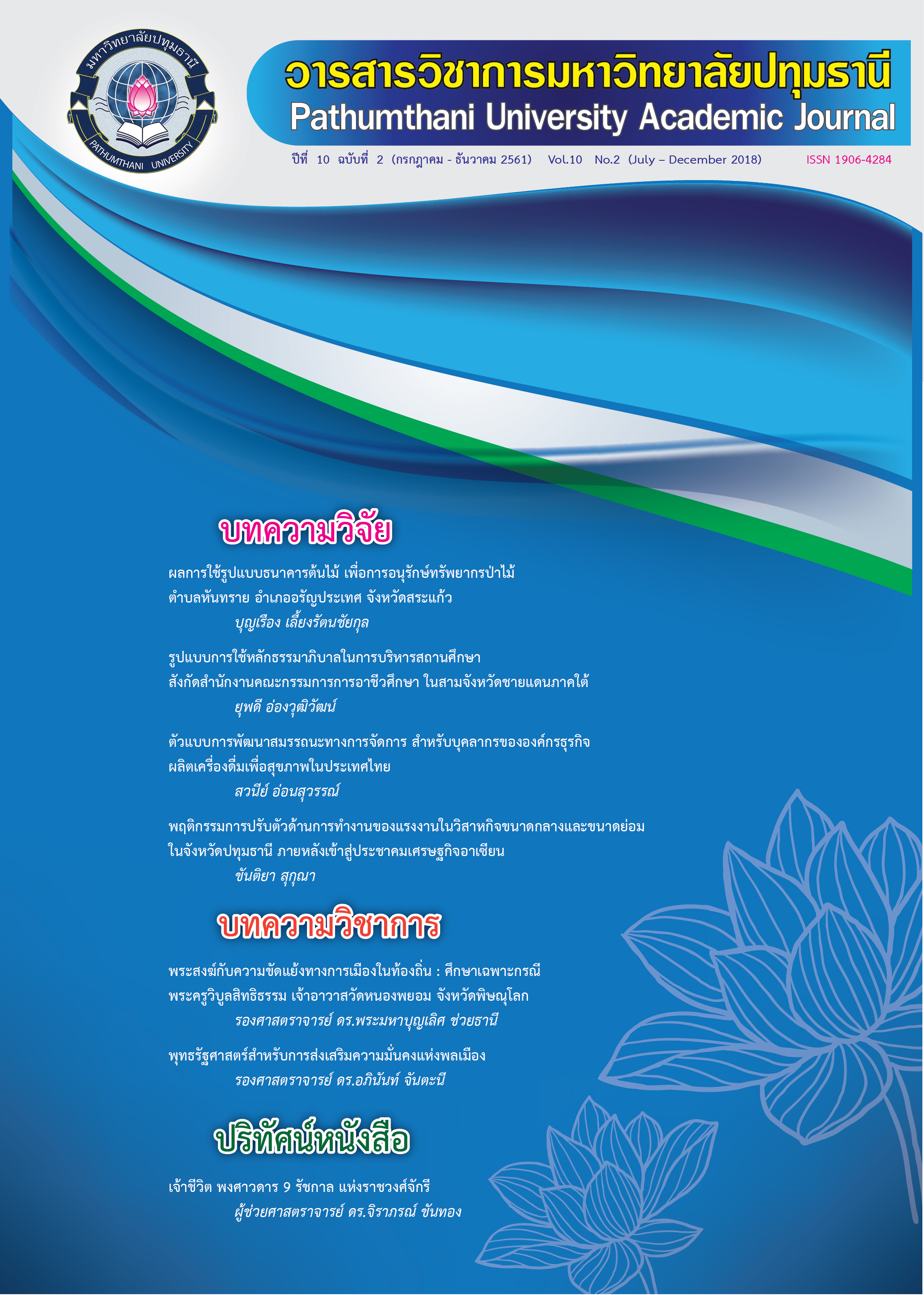รูปแบบการการจัดการองค์กรทางธุรกิจของไทยสู่ความเป็นเลิศ
Keywords:
การจัดการองค์กรธุรกิจAbstract
The research aims to 1) study the management model that makes modern business organization in Thailand able to excel in business organization management. The management style that results in modern business organizations moving towards excellence. The sample of 400 new business organizations in Thailand was used in the quota sampling. The percentage of respondents from each business organization in the country was analyzed equally. Data were analyzed by frequency, percentage, mean, standard deviation Route analysis and component analysis to confirm. The research found that Organizational atmosphere direct positive influence on service management. Knowledge Management Innovation factor and business organization management for excellence, respectively, and innovation factors. Positive influence on organization management for excellence. Statistically significant at the 0.05 level
References
2. ไชยันต์ ไชยพร. (2544). ผู้ควบคุมความรู้ความจริง The Master of Truth: จากมือเทพเจ้าถึงมือมนุษย์ : จากคนทรงเจ้าถึงพ่อค้า. ความรู้และอภิสิทธ์ชนทางปัญญา.
3. ดิลก ถือกล้า. (2547). “เปรียบเทียบแนวคิดภาวะผู้นา แบบ Principle Centered Leadership กับ Managerial Grid.” การบริหารคน. (24) 3, 71.
4. ธงชัย สันติวงษ์. (2533). การบริหารงานบุคคล. กรุงเทพมหานคร : สำนักพิมพ์ไทยวัฒนาพานิช.
5. ธีระวัชร ภีระธีระ. (2551). รูปแบบการพัฒนาผู้ประกอบการรายย่อยเพื่อความยั่งยืน. วิทยานิพนธ์ปริญญาศิลปศาสตรดุษฎีบัณฑิต. มหาวิทยาลัยขอนแก่น.
6. นิธินาถ สินธุเดชะ. (2548). การบริหารการเปลี่ยนแปลง : การเพิ่มขีดสมรรถนะขององค์กร. เอกสารสรุปคำบรรยายการประชุมเชิงปฏิบัติการ หลักสูตรเพื่อพัฒนาผู้นา การบริหารการเปลี่ยนแปลง. สา นักงาน คณะกรรมการพัฒนาระบบราชการ วันที่ 1-6 สิงหาคม 2548.
7. ประไพพิศ ลลิตาภรณ์ และคณะ. (2549). คู่มือการบริหารความเสี่ยงทั่วทั้งองค์กร. กรุงเทพมหานคร : หน่วยสอบ ตรวจสอบภายใน มหาวิทยาลัยเกษตรศาสตร์.
8. พงศ์ หรดาล. (2546). การบริหารคุณภาพในงานอุตสาหกรรม. กรุงเทพมหานคร : สุวีริยาสาสน์.
9. พรทิพย์ อัยยิมาพันธ์. (2547). Leadership for Organizational Effectiveness. กรุงเทพมหานคร: สุริยาสาสน์.
10. มัลลิกา ตน้สอน. (2544). พฤติกรรมองค์กร. กรุงเทพมหานคร : บริษัทเอกซ์เบอร์เน็ต จำกัด.
11. รังสรรค์ ประเสริฐศรี. (2544). ภาวะผู้นำ. กรุงเทพมหานคร : ธนธัชการพิมพ์.
12. วัฒนา พัฒนพงศ์. (2546). BSC and KPI เพื่อการเติบโตขององค์กรอย่างยั่งยืน. กรุงเทพมหานคร : สำนักพิมพ์ แปซิฟิค.
13. เสรี วงษ์มณฑา. (2543). การวิเคราะห์พฤติกรรมผู้บริโภค. กรุงเทพมหานคร : ธีระฟิลม์และไซเท็กซ์.
14. เสรี วงษ์มณฑา. (2542). กลยุทธ์การตลาด : วางแผนการตลาด. กรุงเทพมหานคร : ดวงกมลสมัย.
15. Den, Hartog, D.N., &Koopman, P.L. (2001). Leadership in Organization. Handbook of Industrial, Work, and Organizational Psychology: Volume 2 Organizational Psychology. London: Sage.
16. DuBrin, A.J. (1998). Leadership: Research findings, practice, and skill. Boston: Houghton Mifflin.
17. Fullan, M. (2001). Leading in a Culture of Change. San Francisco, CA: Jossey-Bass.
18. Gibson, J.L., Ivancevich, J.M., & Donnelly, J.H. (1997). Organization Behavior Structure Process. 9th ed. New York: McGraw-Hill.
19. Yukl, G. A. (1991). Leadership in organizations. 4th ed. Englewood Cliffs, New Jersey: Prentice-Hall.
20. Zimmerman B, Lindberg C, Plsek P. (1998). Edge ware insights from complexity Science for Health care leaders. Irving, Texas: VHA Inc.
Downloads
Published
How to Cite
Issue
Section
License
บทความที่ได้รับการตีพิมพ์เป็นลิขสิทธิ์ของวารสารมหาวิทยาลัยปทุมธานี
ข้อความที่ปรากฎในบทความแต่ละเรื่อง เป็นความคิดเห็นส่วนตัวของผู้เขียน กองบรรณาธิการไม่จำเป็นต้องเห็นด้วยเสมอไป และไม่มีส่วนรับผิดชอบใด ๆ ถือเป็นความรับผิดชอบของผู้เขียนแต่เพียงผู้เดียว



